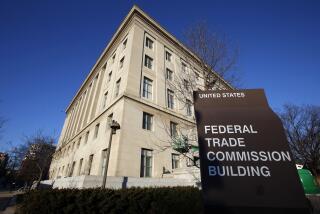FTC warns mortgage companies about ads
- Share via
WASHINGTON — The Federal Trade Commission has warned more than 200 companies about “potentially deceptive” mortgage advertisements that could give borrowers a false impression of the cost of home loans.
The FTC on Tuesday said ads in newspapers and magazines, online and in the mail “may violate federal law” by giving a deceptive picture of mortgage terms. It sent the warning letters to mortgage brokers, lenders and media outlets.
“Many mortgage advertisers are making potentially deceptive claims about incredibly low rates and payments, without telling consumers the whole story,” Lydia Parnes, director of the FTC’s Bureau of Consumer Protection, said in a statement.
The FTC declined to make available a list of the companies it warned because it has not concluded that the companies are breaking the law.
Lucy Morris, an FTC consumer protection attorney, said the letters were sent to large and small companies. Media outlets, she said, were not liable for deceptive advertising but were being encouraged to screen advertising to protect their readers and viewers.
In addition, she said, the agency plans to investigate other companies for possible deceptive advertising practices.
Some advertisements, the FTC said, highlighted rates as low as 1%, but didn’t inform consumers that they often apply to a short “teaser” period and can rise substantially.
Experts said this kind of advertising was one reason consumers -- particularly the elderly, minorities and the poor -- signed up for sub-prime loans given to borrowers with weak credit that jump up to higher rates after a short introductory period.
Although some people were betting that they could refinance their loans before the rates reset, others were not informed adequately of the risks, experts say.
The FTC has detailed guidelines on how mortgage lenders should advertise their products to comply with federal law. It said the ads, some of which were in Spanish, were identified in June as part of a nationwide review.
More to Read
Inside the business of entertainment
The Wide Shot brings you news, analysis and insights on everything from streaming wars to production — and what it all means for the future.
You may occasionally receive promotional content from the Los Angeles Times.










